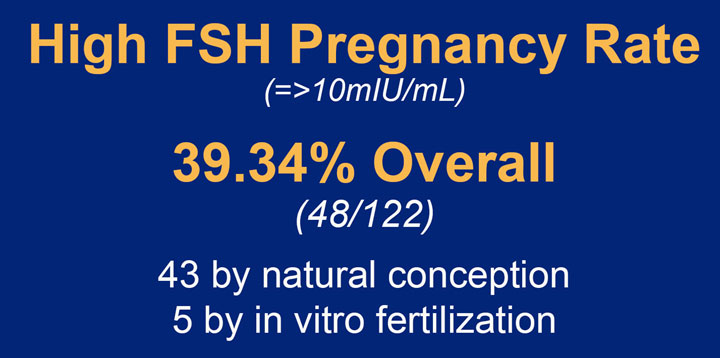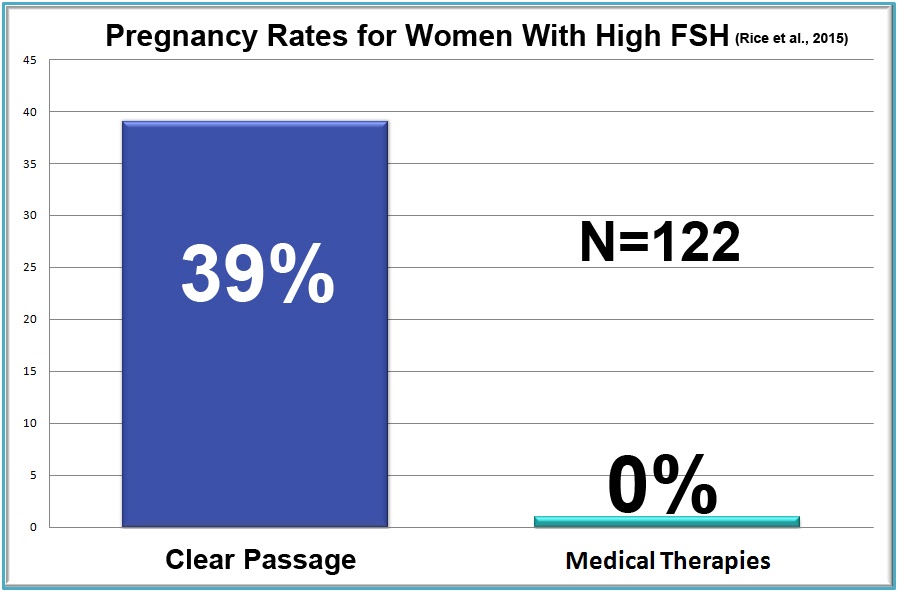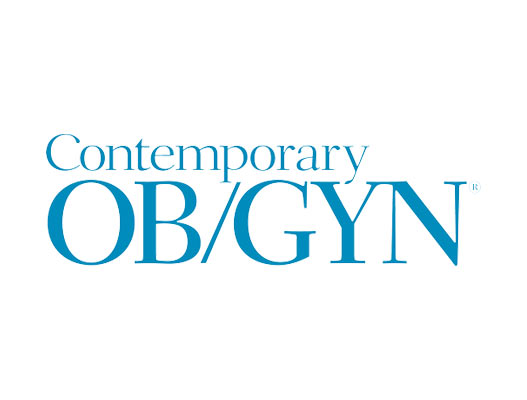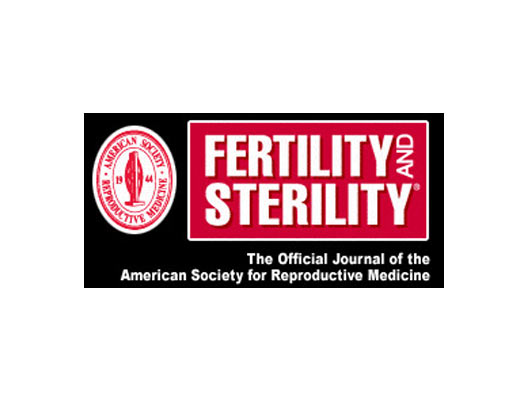
Pregnant with High FSH
Improving Hormone Levels Naturally
Clear Passage®️ is a world leader, with over three decades of experience treating female infertility without surgery or drugs. While our focus was originally on mechanical fertility (helping sperm meet egg and helping uterine implantation), a surprising number of infertile women in their upper 30s and 40s were becoming pregnant naturally after therapy, despite diagnoses of high FSH or age-related infertility.
Our attention was further piqued when a peer-reviewed study of 1,392 women conducted over ten years showed hormonal improvement in 49% of women diagnosed infertile due to high FSH (follicle stimulating hormone[i]). Over 39% of women with diagnosed with FSH levels above 10 conceived after a 5-day Clear Passage session; most had natural pregnancies.

Success Treating Infertility in Women with High FSH
In study participants, 39% (48/122) of the women diagnosed subfertile or infertile due to high FSH became pregnant after receiving the therapy. This is an excellent rate in a group whose expected pregnancy rate was 0%, or close to it. Women in this study had FSH levels of 10 mIU/ml and above, generally so high that they were refused IVF by reproductive physicians.
Complete the online Request Consultation form to receive a phone consultation with a therapist at no cost. Our therapist will review your medical history and goals, answer any questions you have about therapy and determine if our treatment may be able to help you.
Why High FSH Indicates Subfertility
High FSH is not a cause of infertility. Rather, it is an indicator of subfertility or infertility – often associated with advanced reproductive age. At each menstrual cycle, the ovary (in the pelvis) signals the pituitary (in the cranium) to release follicle-stimulating hormone (FSH) to help follicles mature into eggs suitable for implantation. As a woman’s reproductive system ages, her ovaries require more FSH to produce quality eggs. FSH levels of 10 mIU/ml or higher on days 2-5 of the menstrual cycle generally indicate subfertility or infertility, either due to loss of ovarian function, or because menopause has occurred.
Symptoms of FSH or Other Hormonal Issues
Unlike mechanical dysfunction, hormonal issues can sometimes be a little more difficult to diagnose. The symptoms may appear unrelated and spread throughout the body rather than a single area of discomfort, for example post-surgical pain.
- Absent or irregular periods
- Spotting between menstruation
- Overly heavy periods
- Very painful periods
- Hair growth around the face, neck, chest or back
- Weight gain
If you are experiencing any of these symptoms along with infertility, it is quite possible you have a hormonal imbalance. It is important to speak with your doctor and have them check your hormone levels.
Treatments
Clear Passage®️ Treatment
As physical therapists, our first job is to look at biomechanics – the physical bodies our patients bring to us. Clear Passage® uses a “whole body approach” that addresses a patient’s goals along with any structural problems in the body. Focused on the biomechanics of pain, function and fertility, we initially assumed we could not help reproductive hormone levels. Study of the reproductive system indicated that the communication loop between ovary and pituitary was likely blood-born, thus out of our scope of expertise. Over time, several pregnancies in women we treated, often with quite high FSH, appear to be showing a mechanical aspect to infertility in hormonal conditions, apparently treatable by our manual therapy. Our therapy has helped some women with high FSH to conceive naturally – sometimes more than once.
We continue to see success in this area, as described above and documented in peer-reviewed medical literature. We believe this success is due to our work at the ovaries, the dura and the cranium. The dura is a fascial sweater that surrounds the spinal cord, from the lowest part of the tailbone (coccyx) to the base of the skull. From there, it enters the skull, then surrounds the brain and all the tissues and the endocrine glands within it. Sheaths of the dura totally surround and infuse with the pituitary, an important regulator of female reproduction.
We have come to believe that tissues within the skull (including the brain and pituitary) react to adhesive pulls similarly to other tissues in the body. Housed within a well-protected cavity of the sphenoid bone in the center of the skull, the pituitary is considered the “master gland” of female reproduction.
Successful reproductive activity and hormone levels depend on a medically recognized communication loop between the ovaries (in the pelvis) and the pituitary and hypothalamus glands (deep within the head). While the exact mechanism of that intricate communication loop remains a mystery, that loop (the pituitary-hypothalamic-ovarian axis, or PHO) is largely responsible for whether or not a woman can create an egg capable of conception. We find that when we treat the ovaries, and the dural attachments that reach into the brain and surround the pituitary, we often witness significant improvements in FSH levels – and full-term pregnancies in women diagnosed hormonally infertile.
History Treating Women with High FSH
We began treating women with diagnoses of high FSH at the urging of a research gynecologist surgeon, former Chief of Staff of North Florida Regional Medical Center, Richard King, M.D. We gathered data by tracking changes in FSH levels for these women before and after therapy. We were encouraged in these early cases when we saw natural pregnancies in older women including one of whom came to us at age 44 with an FSH of 33.
Because our results in hormonal conditions have been so positive, we now accept women with hormonal infertility, and we actively encourage women with diagnoses that include PCOS, and high FSH levels to attend therapy – soon in the case of high FSH. We suggest you call to learn about our most current success rates so we can determine together whether this therapy may help you.
Other Treatments (not Clear Passage®)
We know of no other procedure nor pharmaceutical medication that can lower FSH and extend reproductive years for women with high FSH.
Published Success Rates
Following the Scientific Method
In all of our studies, we follow the ‘scientific method’ defined by professional researchers. We start with clinical data. If that indicates safety and efficacy for a group or condition, we create larger pilot studies. If these continue to indicate success, we begin studying results in larger populations.
When we first began treating infertile women with our manual therapy, the Clear Passage® approach, we learned we could often help the mechanics of sperm meeting egg by decreasing or eliminating mechanical problems such as adhesions, blocked fallopian tubes, tightness or stenosis of the cervix, and endometriosis. Because we had no data at the time showing we could treat hormonal conditions such as high FSH, or PCOS, we regularly turned down applicants diagnosed with solely hormonal factors. We didn’t want to waste their money or time, or ours.
We discovered our therapy could successfully treat hormonal conditions after a woman we treated for pelvic pain who was diagnosed “menopausal” became pregnant the month after therapy. She had been refused IVF the three months prior to coming to us, due to FSH levels of 18, 19 and 28 during those months. Yet, she became pregnant naturally a month after therapy. She had that child, then (with no further therapy) she became pregnant naturally again two years later – and delivered her second child.
First Clinical Trial
After consulting with our gynecologist advisor and a biostatistician, we agreed to accept women with high FSH into our program with the request that they have their FSH levels measured before, and after therapy. In order to create meaningful statistics, the biostatistician required a minimum of 8 participants. We tested more: 16 women diagnosed infertile with FSH readings over 10 mIU/ml. The women in this trial averaged 39 years of age.
The trial indicated that our therapy was effective for women diagnosed with high FSH, when six of the 16 (38%) became pregnant before they could get their post-therapy FSH checked. Of the remaining ten, nine had decreases in FSH levels, with an average improvement of 11.6 points. Only one woman failed to improve; her FSH increased by one point. Published data from this clinical trial is included in our consumer book, Miracle Moms, Better Sex, Less Pain (Med-Art Press, 2009).
Latest Published Study
In a much larger study, 39% (48/122) of patients with high FSH levels became pregnant after treatment. Of these, 43 had natural pregnancies, and 5 were by IVF. Like so many of our studies, these results closely parallel the 38% success rate of the early clinical trial. It is exciting to see these results in a population of women who were considered hormonally infertile prior to therapy. This is very good news for women wanting to conceive despite being reproductively older, having high FSH, or approaching menopause.
Published success rates for High FSH are stated in the text above. Click here to view all of our infertility success rates.
Clear Passage® – Published Success Rates
A landmark study of over a thousand infertile women treated at Clear Passage® clinics over 10 years examined the therapy’s results in various causes of female infertility. In a subset of 122 women who presented with FSH above the 10 mIU/ml threshold for fertility, 39% (48/122) became pregnant. Remarkably, 90% (43/48) of the successes were natural; five were by follow-up IVF. (Consult our Pre-IVF page for more details if you plan to undergo IVF.)
Many physicians consider our success with these women remarkable; simply put, they should not have been able to conceive. In fact, few options in medicine exist to help women with high FSH to have their own child.
Related Content:
Fertility Financing with CapexMD
To make your therapy treatment plan more affordable, we have partnered with CapexMD, a lender specializing in patient financing for ALL fertility treatment options.
Through our partnership with CapexMD, they are able to offer our patients customized loan programs with highly competitive rates that include a variety of loan types. Loans can include our fees, medications, genetic testing, etcetera, and their easy loan process makes the experience of fertility financing relatively stress-free.
Benefits and advantages of financing with CapexMD
- Easy & secure online application
- Personal attention & concierge service
- Highly competitive interest rates
- Quick & easy approvals
- Family members or friends can apply
- Loans from $3,000 up to $50,000
- Terms from 6 to 60 months
- Highest levels of confidentiality
- No membership fees, no annual fees, and no prepayment penalties
Once approved, our financial counselors will work closely with their Loan Specialists to ensure that your funds are secured on time and your treatment is not delayed. Together with CapexMD we can make sure financial issues do not get in the way of your dream of having a baby.
APPLY online and receive your pre-approval within 24 hours. Learn more about CapexMD by visiting their site www.capexmd.com or by calling 1-888-497 8414.
Financing
A variety of options are available to help you finance the cost of therapy:
Flexible payment options:
Care Credit: https://www.carecredit.com/doctor-locator/
- Good to average credit
- Fixed rate loans with no prepayment penalty
- Interest-free if balance paid in full in 6 months
- Monthly payments as low as $125 a month
- To apply, call 1-800-365-8295 or click the link above to complete an online application.
SoFi: https://www.sofi.com/personal-loans/
- SoFi’s Personal Loan was named NerdWallet’s 2022 winner for Best Personal Loan for Good and Excellent Credit and Best Online Personal Loan overall
- Low-interest rates
- No fees
- Unemployment protection
- To apply visit: https://www.sofi.com/signup/pl?appType=pl
Advance Care: https://advancecarecard.com/
The patient contacts Advance Care and gets a preapproved credit card that can only be spent with participating providers.
- Credit scores better than 635 can receive credit for 15 months with no interest
- Credit scores 600-635 can receive credit for 6 months with no interest
- Credit scores less than 600 can receive credit for therapy
























